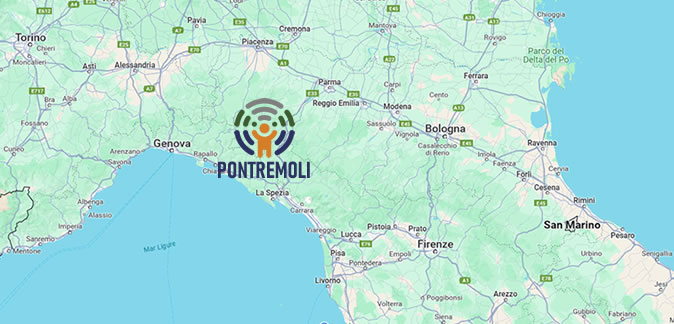Home / Perchè Pontremoli / Dove siamo
Dove siamo
Pontremoli, definita nel Medioevo “unica chiave e porta della Toscana”, già libero Comune, Città nobile del Granducato di Toscana e Sede Vescovile. Questo è il glorioso passato, e oggi?
Pontremoli è un piccolo (circa 7.000 abitanti) ma importante centro della Lunigiana amministrativa e storica, quella che dal Passo della Cisa arriva sino al Mar Ligure e Tirreno, corridoio naturale di persone, merci e idee. Il territorio del Comune di Pontremoli va dalle vette dell’Appennino Tosco Emiliano a quasi 2000 m sul livello del mare ai circa 250 m sul livello del mare del suo bel centro storico. Il suo territorio è parte della Riserva della Biosfera Appennino Tosco Emiliano UNESCO e della Comunità del Cibo di Crinale.
Il centro storico si trova in una vasta conca che apre al territorio delle Valli del fiume Magra e dei torrenti Verde e Gordana. Si è sviluppato in antico nei limiti circoscritti dalla lingua di terra compresa tra il fiume Magra e il torrente Verde, dominata dal Castello del Piagnaro.
Pontremoli è stata nei secoli crocevia di antichi percorsi e snodo strategico sulle vie di collegamento tra la Pianura Padana, la Liguria e l’Italia centrale con la Via Francigena, la Via degli Abati e la Via del Volto Santo. Oggi è ben collegata a Nord e a Sud grazie alla presenza di una ricca rete infrastrutturale veloce come la Strada Statale (SS62 della Cisa) e varie strade provinciali, l’Autostrada A15 Parma-La Spezia e la linea ferroviaria Parma-La Spezia.
La sua ubicazione unica e la rete viaria la rendono “vicina” a numerose e importanti mete turistiche come le Cinque Terre e il Golfo dei Poeti, le Alpi Apuane, la Versilia, o città come Lucca, Pisa, Parma, Firenze, Genova e Milano.
 |
Collegamenti stradali Uscita di Pontremoli |
 |
Collegamenti ferroviari Stazione di Pontremoli |
 |
Aereoporti Genova 110 km Firenze 150 km |
 |
A piedi Via degli Abati Via del Volto Santo |

